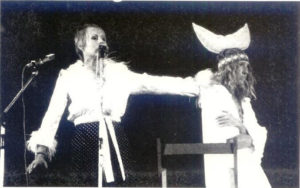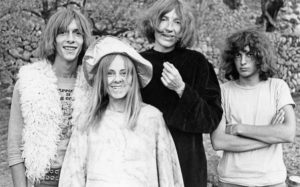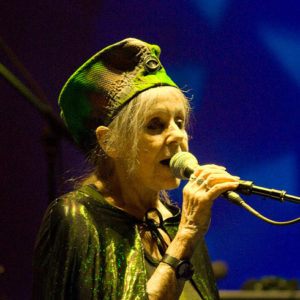Our Story

Gilli Smyth, co-founder of Gong with Daevid Allen, left her body on August 22. She was 83. Together with Daevid, Gilli lived in Deià off and on from 1968 until the late 1970s, making music at the Bananamoon Observatory.
In the beginning
Gilli grew up in a musical household. From an early age she did readings and musical and theatrical performances. According to the biography on her official site, she took three degrees at Kings College, London University, edited the college magazine, wrote ‘controversial political stuff that hit the headlines’ and published books of poetry.
Most versions of Gilli’s life in Deià start when she arrived with Daevid in 1968. But Deià artist and character Phil Shepherd told me he hitchhiked to the village from London with her to help build the Deià Archeological Museum, which opened in 1962. Jackie Waldren, whose husband Bill founded the Museum, confirms that Phil was with Gilli in the village at that time. In part two of Simon Gough’s novel The White Goddess: An Encounter, set in 1960, there’s a character named Gill who it’s highly likely is based on her.
Gill is part of what Robert Graves warns Simon are the ‘Dregs, most of them – beats, hipsters, whatever they call themselves. They’re all into LSD and pot and God knows what else – it’s the Deya disease.’ Simon meets Gill at a party, ‘The men mostly in black, the girls in dark diaphanous dresses dripping with beads, their strange make-up hollowing their cheeks and eye sockets. Small children were dancing among them.’
When Simon first spots her, Gill is ‘sitting cross-legged on a cushion in the middle of the passage, a lighted candle in front of her, her hair in pigtails, fists clutched to the side of her head, forefingers pointing ceiling-wards like antennae, staring up…through a pair of granny glasses.’ Gill offers Simon his first ever joint and tells him she’s a poet. Although he finds her strange, she’s also ‘surprisingly easy to talk to, calm and almost strangely serene.’
In keeping with the dark, overheated, quasi-mystical mood of Simon’s book, Gill is convinced she’s psychic and sees danger everywhere. This was true of the real Gilli. A friend who lived near Gilli and Daevid in 1970s Deià remembers her receiving a delivery of gas cylinders, ‘butanos’, and refusing to let one of them into the house because it had ‘bad vibes’.
Paris, space whispering, 1968
Gilli met Daevid Allen in Paris in the mid-1960s. Thanks to his friendship with Robert Wyatt – whose mother Honor was a close friend of Graves’s – he too had spent time in Deià. Was this a factor in them connecting, I wonder. Whatever the reason, Gilli and Daevid co-founded Gong in 1967 and she would go on to have a powerful creative influence on the first five studio albums. Among her contributions was ‘space whispering’.
Space whispering is a kind of atonal singing, vocalising and ‘musical landscaping’ that helped define the Gong sound. Gilli said of her early technique, ‘I began with poetry, lines of words. Then I started enlarging the sounds that were in the ideas of words, and the ideas became sounds…The aim is to provoke the audience, then get them excited — make them active rather than passive. The main aim of our music is to immerse our audience in a state out of the daily life.’
Gilli’s contribution certainly helped Gong achieve its mission. It also helped the band sound like no other you’ll have ever heard. As Daevid said ‘In the end, Gilli is the only person in the band that is without precedent.’
Goddess, witch, mother
In 1968, Gilli and Daevid were caught up in the revolutionary fervour sweeping Paris, not to mention a drug bust, and had to flee the city. They headed for Deià. The village was to be Gilli’s home base off and on for roughly the next ten years.
Dan Shepherd, son of Phil and Lali, spent part of his childhood in Deià and remembers hanging out with Gilli and Daevid’s boys Tali and Orlando. Although these were wild times in the village, Gilli and Daevid ‘stayed in a lot, experimenting with music. They didn’t seem like big party types actually. They were quiet, busy.’
This is one of the things I absolutely admire about Gilli and Daevid. Whatever the reason – world domination through daftness, maybe – they really worked hard.
Recalling Gilli, Dan says ‘She was very warm and calm with a soft witch-like voice. A lovely lady.’ Every account of Gilli and her life mentions this witchy quality. Whether her witchiness was cultivated or not – and perhaps influenced by living in Deià and reading The White Goddess – Gilli certainly manifested the fundamental principle in the Gong universe, the Shakti Yoni.
As author, music writer and fan Dave Rimmer put it to me, ‘Somehow, in the mystical architecture of classic Gong, which runs deeper than you might think from a cursory glance, she represents the Goddess, the Great Mother, the Good Witch. Without her the whole thing would have been somehow incomplete. Pioneering, too, in that she developed her own style of doing vocals and they in turn were one of the elements that made Gong sound like Gong. She’s also the author of some very intelligent lyrics. Try “The House Is Not the Same” by Mother Gong.’
Inscrutably exploring uncharted territory
Apart from the witch-goddess-mother aspect of Gilli’s character, there was a certain inscrutability to her, according to Jerry Hart, who played with her in Gong and Mother Gong.
Together with Tony Bullock, a bamboo flute player and fellow Gong freak, 17-year-old Jerry trekked to Deia where they’d heard there was a ‘Gong creative community’ with Daevid Allen at its centre. ‘We turned up at Bananamoon unannounced in February 1978,’ Jerry recalls. Deià was lit up like a Christmas tree and sparkling. ‘A youthful Sara Raphael directed us to the Bananamoon Observatory, Daevid’s house and studio. We walked down the Clot, the torrent gushing, knocked on the door, said “Hello Daevid, we’ve come from England” and – miraculously – he didn’t tell us to f–k off (a greeting I subsequently learnt he was very willing to offer to other visiting Gong freaks). Instead, he invited us in. My first impression of Gilli was that she was polite and protective of her children. Not unfriendly, just taking her lead from Daevid.’
Jerry, a guitarist, was invited to join Gong and in June of that year he played the Canet Roc festival as part of a 14-piece band. In October 1978, Gilli asked Jerry to play guitar in Mother Gong. By that time, Gilli was very much into being ‘a combination Space Witch and maternal radical’. Jerry remembers posing in front of a billboard for the Barcelona Playboy Club sticking up two fingers as a protest against male patriarchal culture.
‘But,’ he says, ‘I never quite figured out Gilli, or her philosophy. To me, her take on feminism was trying to fit a hexagonal peg in a septagonal hole. Daevid’s vision might have been naïve and simplistic but it was easy to grasp. Gilli was more inscrutable. Let’s not forget, though, Gilli was exploring uncharted territory. She was reinventing herself as something different from a dutiful, wife and the academic she may have been on track to become.’
While they may have been a litttle opaque, there’s no doubt that Gilli’s politics were sincere. Brian Abbott, who took over the Gong Appreciation Society in 1980 when Gilli left England for Australia with her partner Harry Williamson, remembers her as ‘always up to date with the current political situation and the general worldview…she was rarely without a newspaper.’
The Space Witch always had two feet somewhere near the ground.
Brian and Gilli remained close friends. When The Invisible Opera Company of Tibet band, which he formed, played Glastonbury in 1994, Gilli guested and performed her witch poems. ‘I feel very privileged to have spent time with her and to have known her as I did, ‘ Brian says. ‘She was a true original and innovator on many levels, with no rock and roll ego.’
Gilli, the Book of Am and the Book of Intxixu
Jerry Hart was also involved in the Book of Am recording project that happened in Deiá in the late 1970s. This was the brainchild of Juan Arkotxa and his partner Leslie Mackenzie, who rented a house on the Puig that had been rented by Gilli and Daevid some years earlier. It was where the Soft Machine rehearsed and the Book of Am was recorded.
Leslie told me how Gilli got involved. ‘Gilli was immediately very enthusiastic and supportive when we arrived in Deia in 1979 with our huge hand-made esoteric Book of Am, the basis for the legendary album that followed. She especially loved the Welsh material we were using – the “Song of Taliesin” and the “Cauldron of Regeneration” – and within months had recorded her wonderful version of the story of Welsh hero Taliesin in her inimitable voice. The next year she took on the role of ‘Owl Woman’ in the follow-up Book of Intxixu. This mountain shaman and healer, introduced to heroine Lezeko by Ogma Sunface, played by Daevid Allen, acted as guardian to the magic mushrooms and to the Moon Goddess herself. Gilli interpreted a shamanistic poem based on Robert Grave’s recordings of Huatla shaman Maria Sabina. Her fabulous “moon whisper” and “cosmic orgasm” voice gave this section of the story amazing depth and quality, especially in conjunction with Daevid and Carmeta Mansilla as the Moon herself.’
Unfortunately when it came to the remixes of these albums in 2012 to 2015, Gilli was no longer able to record new takes but you can hear the otherworldly originals on the reissues.
Love and laughter on the edge
From 1978 onwards, Gong repeatedly came together and fragmented again. Mother Gong opened for Bob Dylan at one point (!). Gilli was involved in a couple of techno permutations, including Goddess Trance and Goddess T. Dan Shepherd turned me onto Even As We, the excellent album she recorded with Orlando as Glo.
Since Gilli died, I’ve been listening to The Best of Mother Gong every day. It’s far more musically adept and eclectic than I’d have ever thought and Gilli’s voice always stops things getting boring. I find the way she carried on writing, recording and performing as long as she could wholly admirable. I love her fearlessness. And, as ever, I’m a little wistful that I didn’t live Deià in those incredibly creative times.
So, along with everyone who knew Gilli or her art, I’ll leave you with this from the official Gong website: ‘Her unique stage presence and vocals manifested and determinedly represented a vital, deeply fundamental feminine principle within the Gong universe. … We will miss her. Love and laughter to the Good Witch.’
Links
Mother Gong ‘The House Is Not the Same’











